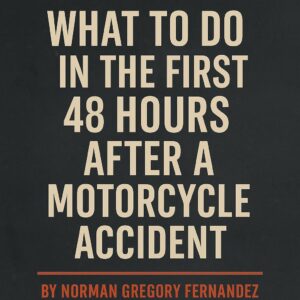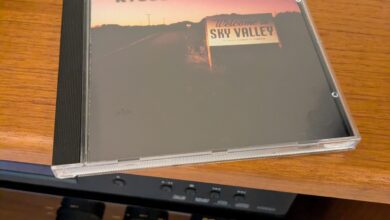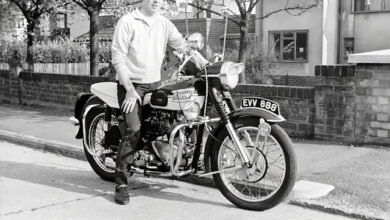What to Do in the First 48 Hours After a Motorcycle Accident — A Guide for Riders and Their Loved Ones

By Norman Gregory Fernandez, Esq.
The Biker Law Blog | https://bikerlawblog.com

Motorcycle_Accident_48_Hours_Guide
As a motorcycle accident attorney and rider myself, I’ve seen firsthand how critical the first 48 hours after a motorcycle crash can be. Whether you’re the injured rider, a passenger, or a family member trying to help, what you do—or fail to do—during this crucial window can have a lasting impact on your health, your legal rights, and your ability to receive compensation.
This article will walk you through the essential steps that should be taken within the first 48 hours after a motorcycle accident, and why it’s vital to retain a motorcycle accident expert like myself, Norman Gregory Fernandez, as soon as possible.
Step 1: Get Immediate Medical Attention
The first and most important step after any motorcycle accident is to seek immediate medical care. Even if you feel fine or think your injuries are minor, get evaluated by emergency medical personnel or go to the nearest emergency room. Adrenaline and shock can mask serious internal injuries, including concussions, organ damage, and spinal injuries.
If you’re unable to make decisions for yourself due to your injuries, a family member or representative should step in to ensure you receive the necessary treatment and that all injuries are documented properly.
Why It Matters:
-
Medical records create a critical link between the accident and your injuries.
-
Delays in treatment can give insurance companies a reason to deny your claim.
-
Proper care can prevent complications and long-term disabilities.
Step 2: Document the Scene (If You Can)
If you’re physically able—and it is safe to do so—take pictures or videos of the accident scene, your motorcycle, the other vehicle(s), skid marks, road conditions, traffic signs, and your injuries. If you’re not able, ask a witness or a loved one to do this for you.
Be sure to gather:
-
Names and contact information of witnesses
-
Driver’s license and insurance details from the other party
-
Police officer’s name, badge number, and report number
Why It Matters:
-
This evidence may disappear quickly—vehicles are towed, road debris is cleared, and physical injuries begin to heal.
-
Visual evidence is often more persuasive than testimony in court or negotiations.
Step 3: File a Police Report
In California, you must report a motorcycle accident involving injury or death to the police and the DMV. Make sure an official police report is filed and obtain a copy as soon as it’s available. The report will often include the officer’s initial findings regarding fault, witness statements, and more.
If you were transported to a hospital and unable to speak to the officer at the scene, make arrangements to provide a statement as soon as possible. Again, if you’re incapacitated, a family member or legal representative can assist in obtaining this report and ensuring your version of events is recorded.
Step 4: Preserve Evidence
Don’t repair or dispose of your damaged motorcycle, helmet, clothing, or any other gear. These items could be vital evidence in proving the severity of the crash, the nature of your injuries, or product liability issues.
Store them in a secure location and take photos of everything. If there was a GoPro or similar camera on your bike or helmet, back up the footage immediately.
Step 5: Avoid Speaking to Insurance Companies
You may be contacted quickly by the other driver’s insurance company. Do not give a recorded statement, accept any settlement offer, or admit fault without speaking to a motorcycle accident lawyer first. What you say can and will be used against you.
Tell any insurance adjuster that you are seeking legal representation and refer all communications to your attorney.
Step 6: Contact a Motorcycle Accident Expert Immediately
This is where I come in.
The sooner you hire a qualified motorcycle accident attorney—like myself, Norman Gregory Fernandez—the better your chances of receiving full and fair compensation. As both an attorney and an experienced biker, I understand the unique challenges riders face both on the road and in the courtroom.
Here’s Why Timing is Everything:
-
Preservation of Evidence: We can act quickly to secure surveillance video, black box data from other vehicles, and accident reconstruction experts if needed.
-
Witness Statements: Memories fade fast. Early statements are often more detailed and credible.
-
Insurance Navigation: We handle all communication with the insurance companies so you can focus on healing.
-
Medical Treatment Coordination: We can help you find qualified doctors and ensure your treatment is documented properly.
-
Litigation Preparation: If your case needs to go to trial, early involvement means we’re building your case from day one.
Hiring me early can also prevent costly mistakes that could hurt your case, such as posting on social media, delaying treatment, or failing to document expenses.
Step 7: Notify Your Own Insurance Company
Even if you were not at fault, notify your motorcycle insurance carrier about the accident. Be factual but concise. Do not speculate about fault or the extent of your injuries. Let your lawyer handle the details.
Failure to notify your own carrier in a timely manner could jeopardize coverage under your policy, including MedPay or uninsured motorist benefits.
Step 8: Keep a Recovery Journal
Start a journal documenting your injuries, pain levels, treatments, emotional distress, and how the accident has impacted your daily life. Include:
This journal can serve as powerful evidence for your pain and suffering claim.
Step 9: Don’t Wait to Act
California has a two-year statute of limitations for personal injury claims—but waiting can weaken your case long before that deadline. Delayed treatment, lost evidence, and unrecorded witness statements can all significantly reduce your settlement or verdict.
Final Thoughts from Attorney Norman Gregory Fernandez
Motorcycle accidents are traumatic and often life-changing events. As a rider myself, I know what it’s like to hit the road and trust that others will share it responsibly. When that trust is broken by a negligent driver, you deserve justice—and someone who will fight like hell to get it for you.
The first 48 hours after a crash are critical. If you or a loved one has been injured in a motorcycle accident, don’t wait. Contact me immediately at https://thepersonalinjury.com or through the Biker Law Blog at https://bikerlawblog.com. I’ve helped countless riders and their families get the compensation they deserve—and I’ll do the same for you.
Ride safe. Ride smart. And if the worst happens, call someone who rides—call me.
About the Author
Norman Gregory Fernandez, Esq.
Founder, The Law Office of Norman Gregory Fernandez
Motorcycle Accident Attorney | Rider | Advocate
Norman Gregory Fernandez is a seasoned California personal injury attorney with over 28 years of experience. As a passionate biker himself, he has dedicated his career to fighting for the rights of injured motorcycle riders and their families. He is the founder of the Biker Law Blog and the nationwide resource InjuredBikers.com.
Contact:
📞 (800) 816-1529
🌐 www.thepersonalinjury.com
✉️ Click here to contact Norman



